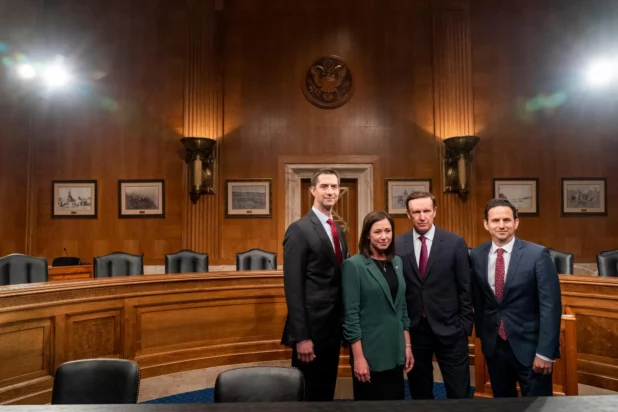Our bill will let parents protect their kids in the digital world, just as they do in the real world. Protecting kids online is something all Americans can agree on and must be addressed. https://t.co/1WIflD8S9m
— Tom Cotton (@SenTomCotton) May 4, 2023
Social media companies have failed to protect kids from harmful content on their platforms. Our bill will put parents in control to protect their children online. https://t.co/kTnqbnQfVZ
— Tom Cotton (@SenTomCotton) May 2, 2023
Yeah, I mean.
I’ve never seen Republicans ever do anything in my lifetime.
So you’ll forgive me if I’m skeptical.
Sen. Katie Britt says she hears about it constantly when she is at home in Alabama — at school track meets, basketball tournaments and on her regular morning walks with friends.
And when she was running for the Senate last year, Britt says, “parent after parent” came up to her wanting to discuss the way social media was harming their kids.
Britt also navigates the issue in her own home, as the mother of a 13-year-old and a 14-year-old.
“Enough is enough,” says Britt, a Republican who last week introduced bipartisan legislation with three other senators — all parents of young children and teenagers — to try and better protect children online. “The time to act is now.”
Connecticut Sen. Chris Murphy, too, deals with it firsthand as a father to an 11-year-old and 14-year-old.
Murphy says he’s seen the upsides to social media, like connection during the pandemic and silly videos that bring them joy.
But he’s also seen the downsides, including children he knows who he says have ventured into dark corners of the online world.
“I just feel like we’ve reached this point where doing nothing is not an option,” says Murphy, a Democrat. “And increasingly, when members of Congress go home, this is one of the first or second issues that they’re hearing about from their constituents.”
Legislation introduced by Britt and Murphy, along with Sens. Brian Schatz, D-Hawaii, and Tom Cotton, R-Ark., aims to prohibit all children under the age of 13 from using social media and would require permission from a guardian for users under 18 to create an account.
Sen. Tom Cotton, R-Ark., Sen. Katie Britt, R-Ala., Sen. Christopher Murphy, D-Conn., and Sen. Brian Schatz, D-Hawaii
While it is one of several proposals in Congress seeking to make the internet safer for children and teens, the four senators said in a joint interview with The Associated Press that they believe they are representative of millions of American parents who are gravely worried that social media companies are largely unchecked in what they can serve up to their children.
“The idea that an algorithm has some sort of First Amendment right to get into your kid’s brain is preposterous,” says Schatz, who initially brought the bipartisan group of four together. “And the idea that a 13-year-old has some First Amendment right to have an algorithm shove upsetting content down their throat is also preposterous.”
Along with the age restrictions, the legislation would prohibit social media companies from using algorithms to recommend content to users under 18.
It would also require the companies to try and verify the ages of users, based on the latest technology.
The bipartisan bill comes at a time when there is increasing appetite in Congress for regulating social media companies — and as those companies have for years eluded stricter regulation in Washington.
Some states like Utah and Arkansas have enacted their own laws, creating an even bigger challenge on the federal level.
This time, the four senators said they believe there is an unusual bipartisan momentum around the issue as parents grapple with a burgeoning post-pandemic mental health crisis among young people.
Recent data from the Centers for Disease Control and Prevention, for example, showed that 60% of teen girls reported feelings of persistent sadness or hopelessness, and 30% said they seriously considered attempting suicide.
“This is an issue that unites parents all across the country, no matter what their political views on other matters might be,” Cotton said.
Yeah, it’s very popular, I’m sure.
But you forget: we live in a democracy.
The popular will means absolutely nothing to anyone.
“Their business model is feeding on kids’ insecurities and anxieties to keep them on the screen longer, to sell them more stuff.”
— Sen. Chris Murphy (D-CT) explains why a bipartisan group of senators are pushing a bill to ban kids under 13 from joining social media platforms pic.twitter.com/ar3Ij5LWZc
— The Recount (@therecount) May 1, 2023

